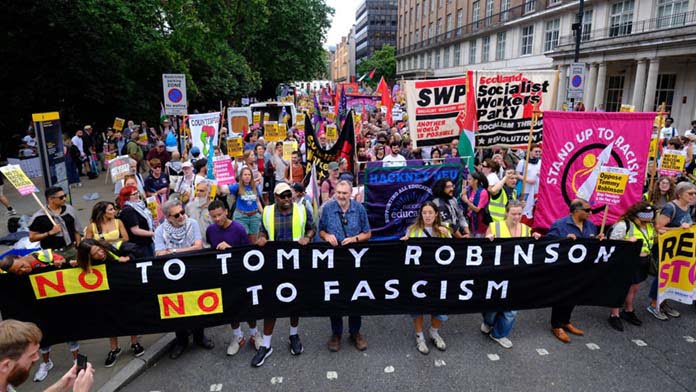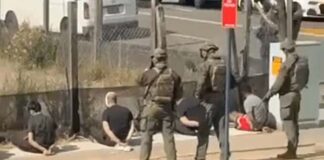A surge of far right rallies and violence across Britain and Northern Ireland aimed at refugees and migrants shocked millions last month.
In the northern town of Rotherham, about 700 racists gathered on 4 August outside a hotel used to house asylum-seekers chanting, “Get them out.” The rabble stormed the hotel and lit a fire inside.
Ahmed was inside the hotel and told Solidarity’s sister paper Socialist Worker, “I came to Britain from Afghanistan to get away from being killed, for safety for me and my family.
“And then on Sunday it felt like I was going to be burned. They wanted to kill us.”
Within days, mass mobilisations of anti-fascists turned the tide. On 7 August, tens of thousand mobilised across the country.
Some 7000 took to the streets in the London suburb of Walthamstow. A similar number rallied in the south-west city of Bristol, chanting “Refugees are welcome here” and “Free Palestine”.
In almost every place the far right had said they would march they were either massively outnumbered or failed to show up at all.
It was a similar story on 17 August for a national day of action called by Stand Up To Racism.
In the south coast city of Portsmouth, where 400 anti-racists turned out to oppose 40 from the far right, the mobilisation was supported by three unions, the local trades and labour council and a local Labour MP.
Official racism
The wave of hate has been driven by years of official racism coming from the top of society.
The former Conservative government took advice from their Australian counterparts such as former Liberal leader Alexander Downer on how to implement cruel border control policies.
They promised to “stop the boats” while calling desperate contingents of refugees crossing the English Channel an invasion.
They unleashed raids on the homes of asylum-seekers, taking them to detention centres including barges functioning as floating prisons.
And the Conservatives proposed deporting asylum-seekers to the African nation of Rwanda—deliberately mimicking Australia’s policy of offshore detention in Papua New Guinea and Nauru.
Years of fearmongering saw the racist Reform Party led by stockbroker Nigel Farage, a friend of Donald Trump, win more than 4.1 million votes (14 per cent) and five seats in the national election held on 4 July.
That’s why when prominent British fascist Tommy Robinson (whose real name is Stephen Christopher Yaxley-Lennon) called a rally in London on 27 July, 15,000 racists took to the streets.
The event was a sea of St George’s and Union Jack flags—interspersed with Israeli flags and banners supporting Donald Trump.
And marchers chanted Islamophobic slogans such as, “This is fucking England, you can stick Islam up your arse.”
Too cruel
Many hoped the new Labour government of Sir Keir Starmer would turn the tide on racism—but it has carried on where the Conservatives left off.
Labour abandoned the Rwanda plan, not because it was too cruel but because it was unworkable.
Instead they said they would be tougher than the Conservatives and unleashed what they boasted would be a (northern) summer blitz of deportations.
Labour home affairs minister Yvette Cooper has since doubled down, ordering 14,000 deportations between now and Christmas and saying that asylum-seekers must be rounded up and “sent home”.
The message from the top is clear—migrants are a threat to society, and people are right to want them out. And the entire political establishment has gone along with it.
Britain’s rulers may not want fascist riots on the streets but they are happy to punish refugees and foment racism to distract attention from declining wages, the collapse of the National Health Service and attacks on civil liberties.
That’s why British socialists are arguing that anti-racists cannot look to the police, the courts or politicians to hold back the far right, who will hope the anti-fascist rallies in August were a temporary obstacle.
Continuing resistance to the far right must come from below, uniting unionists and migrant communities, socialists and those who voted Labour in July.
We are living through a period of polarisation that can lead to people moving to the left or the right.
Millions in Britain—and elsewhere, including Australia—are angry at the damage that capitalism is unleashing on their lives and our planet.
The left needs to argue a way forward based on class struggle and working class unity that taps into that anger and directs it at those at the top who are responsible for the misery, not at migrants and refugees.
As Chantelle Lunt, a Labour councillor active with Merseyside Black Lives Matter, put it, “The only way to get rid of hate is together—the same people coming for migrants come for asylum-seekers and LGBT+ people.”
By David Glanz






